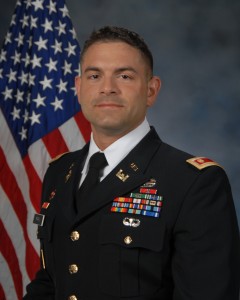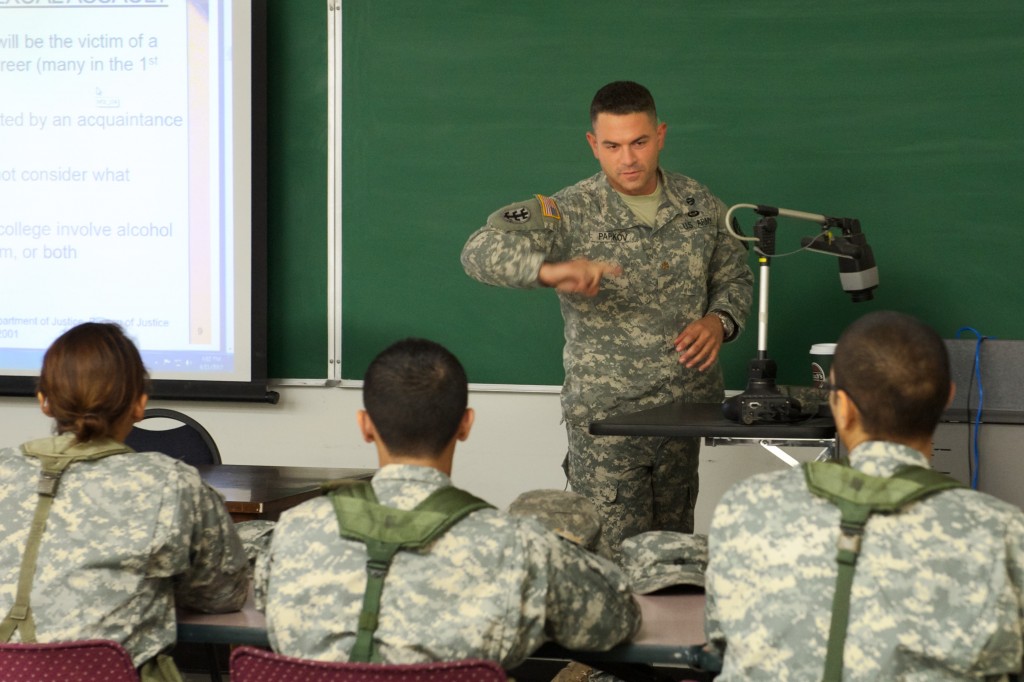
“Leadership Excellence” is an Army Reserve Officer Training Corps (ROTC) motto and one that Major Heath Papkov, assistant professor of military science at California State University, Dominguez Hills, lives by. In an affirmation of this, in February Papkov was given the 2011-12 Colonel Leo A. Codd Memorial Award.
Presented to one outstanding ROTC instructor from each military branch of service –Army, Navy, and Air Force–the award is also known as the ROTC Instructor of the Year Award. Army nominees must hold the rank of lieutenant commander, major, or below, and are evaluated on such criteria as their teaching performance (including evaluations by students), counseling abilities, civilian activities, and contributions to the national ROTC unit.
Papkov was nominated by Colonel Robert Kirkland, historian and professor of military science at University of Southern California. The Trojan Battalion Army ROTC is the commanding unit for the companies at CSU Dominguez Hills, CSU Long Beach and University of California, Irvine, which together form the Los Angeles Army ROTC.
In a letter of recommendation, Kirkland wrote that Papkov puts a high level of personal care into each cadet, and that he is a perfect example of the “be-know-do leader.” Kirkland also praised Papkov as an innovative instructor who has been at the forefront of getting more Hispanics into the ROTC program at CSU Dominguez Hills, and has been successful in getting local community leaders to visit the campus.
“MAJ Papkov is the most fit officer I have served with in over 23 years of service. He is also one of the smartest,” Kirland wrote.
Papkov, who has served 13 years in the Army and has been deployed into combat three times, was ultimately selected for the award out of a pool of instructors from 273 ROTC programs nationwide.
“I’m very honored to receive the award, but it’s not why I do what I do,” Papkov said.
Trained through the ROTC program at the University at Albany in New York, where he also earned a bachelor’s degree with a double major in public administration and communications, Papkov went on to command a combat engineer company in Afghanistan and then to teach military science at USC. In January 2011, he came to CSU Dominguez Hills to teach cadets the “office side of the house” as he describes it.
He said students are what motivate him and it’s their success that makes him look good. He takes particular pride in the students at CSU Dominguez Hills because of the challenges so many of them have had to overcome to attend college.

“When I came to this campus, it became a passion, because the students really want to be here. The students on this campus are phenomenal. They weren’t handed anything. They really have to fight for everything they get,” said Papkov, adding that many CSU Dominguez Hills students work more than one job to pay for their tuition and expenses.
The government utilizes the ROTC program to fill the gaps in leadership among the nation’s armed forces, Papkov said, and his role in the university’s program is to train students to become leaders in the military and in their communities.
“I believe in this program for this university. I believe in the success it will give these students,” Papkov said. “They love and appreciate the fact that they are going to have a career immediately after they graduate.”
A common misconception is that upon entering the ROTC program students mandatorily become enlisted in the military and go into basic combat training, but Papkov said what really happens is students go into officer training, where they are taught such leadership skills as how to manage personnel, time, and millions of dollars worth of equipment. When they complete the program they will have leadership experience, as well as the core values of the Army – trust, integrity, and honor, for which most any civilian employer is willing to pay.
“What we call the program is the resume builder,” said Papkov. “The chances of a college graduate getting a high-paying job right out of college, nowadays, are very slim. Most have to go into internship programs or take low-end jobs and work their way up. With the military, once you commission, you can jump right into an estimated $47,000 [a year] job with full medical benefits.”
Students become commissioned officers upon graduating with officer training and a university degree; that is to say, they are promoted to the rank of second lieutenant, and subsequently serve full-time in active duty forces or, in some cases, part-time in the Army Reserve or National Guard.
Graduating from a university ROTC program is one of three avenues students can take toward becoming a commissioned officer. The others are through Officer Candidate School, a non-collegiate program for enlisted soldiers who have already earned an undergraduate degree, and by earning a degree from the four-year military graduate school United States Military Academy at West Point. For the latter, students must be admitted through a nomination process that includes a recommendation from their congressional representative, or other qualified professional.
Attending West Point, while being the most prevalent path, may be prohibitive for many. Alternatively, Papkov said establishing ROTC programs onsite at universities throughout the nation is like having a mobile, more affordable West Point right on campus. And, in the university environment students can continue with their normal studies, and personal and work obligations, while taking military training courses.
“The benefit is that the student still gets to have that college experience of being in a fraternity, or sorority, or playing football, or being in the student body,” Papkov said, making the contrast to students at West Point who have more restrictions, such as curfew, because it is structured and managed like the military.
There are about 25 students enrolled in the ROTC program at CSU Dominguez Hills this semester. Papkov said he hopes the program will grow and that it can support about 30 students every semester with competitive, merit-based scholarships and financial assistance, which allows students to focus on their studies.
Financial support for medically and physically qualified students who maintain good grades includes annual allowances of $10, 000 for room and board, $1,200 for textbooks, as well as a monthly stipend between $350 and $500 for participating in the program, according to Papkov. Additionally, some students may be eligible for tuition assistance.
The Army is committed to increased outreach efforts designed to attract minority students to its ROTC programs, with the goal of increasing diversity in the officer corps to reflect that of the enlisted corps, and, Papkov said, “CSU Dominguez Hills is the ideal campus to achieve this.”
Latinos are reportedly one of the underrepresented populations in the Army’s officer corps. To try figure out why, in 2011 Papkov, along with Kirkland, conducted a study, “Hispanic propensity to participate in Army ROTC in Southern California.” The study aimed to evaluate the Latino population’s understanding of the officer corps in the military. What they found was, generally, Latinos in this region have little understanding of what exactly an officer in the military does.
“People often think military officers are police officers or that they are soldiers running through the woods with a rifle,” said Papkov. “People just don’t have the knowledge of what we do. What we do is…we’re leaders.”
In continuation of developing his leadership skills, in June, Papkov will leave CSU Dominguez Hills to attend military training at Fort Leavenworth, Kan., where he will participate in the Army’s Intermediate Level Education program to prepare himself to take command of a battalion unit. At the same time, he plans to earn his master’s degree in military arts, and public planning and policy at Kansas State University.